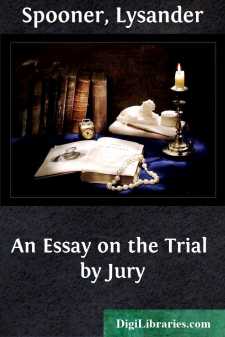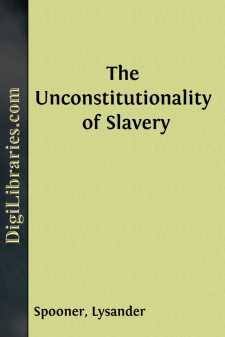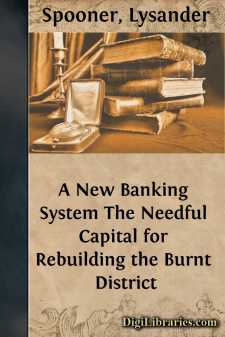Categories
- Antiques & Collectibles 13
- Architecture 36
- Art 48
- Bibles 22
- Biography & Autobiography 813
- Body, Mind & Spirit 142
- Business & Economics 28
- Children's Books 17
- Children's Fiction 14
- Computers 4
- Cooking 94
- Crafts & Hobbies 4
- Drama 346
- Education 46
- Family & Relationships 57
- Fiction 11829
- Games 19
- Gardening 17
- Health & Fitness 34
- History 1377
- House & Home 1
- Humor 147
- Juvenile Fiction 1873
- Juvenile Nonfiction 202
- Language Arts & Disciplines 88
- Law 16
- Literary Collections 686
- Literary Criticism 179
- Mathematics 13
- Medical 41
- Music 40
- Nature 179
- Non-Classifiable 1768
- Performing Arts 7
- Periodicals 1453
- Philosophy 64
- Photography 2
- Poetry 896
- Political Science 203
- Psychology 42
- Reference 154
- Religion 513
- Science 126
- Self-Help 84
- Social Science 81
- Sports & Recreation 34
- Study Aids 3
- Technology & Engineering 59
- Transportation 23
- Travel 463
- True Crime 29
An Essay on the Trial by Jury
by: Lysander Spooner
Description:
Excerpt
CHAPTER I.
THE RIGHT OF JURIES TO JUDGE OF THE JUSTICE OF LAWS.
SECTION I.
For more than six hundred years—that is, since Magna Carta, in 1215—there has been no clearer principle of English or American constitutional law, than that, in criminal cases, it is not only the right and duty of juries to judge what are the facts, what is the law, and what was the moral intent of the accused; but that it is also their right, and their primary and paramount duty, to judge of the justice of the law, and to hold all laws invalid, that are, in their opinion, unjust or oppressive, and all persons guiltless in violating, or resisting the execution of, such laws.
Unless such be the right and duty of jurors, it is plain that, instead of juries being a "palladium of liberty"—a barrier against the tyranny and oppression of the government—they are really mere tools in its hands, for carrying into execution any injustice and oppression it may desire to have executed.
But for their right to judge of the law, and the justice of the law, juries would be no protection to an accused person, even as to matters of fact; for, if the government can dictate to a jury any law whatever, in a criminal case, it can certainly dictate to them the laws of evidence. That is, it can dictate what evidence is admissible, and what inadmissible, and also what force or weight is to be given to the evidence admitted. And if the government can thus dictate to a jury the laws of evidence, it can not only make it necessary for them to convict on a partial exhibition of the evidence rightfully pertaining to the case, but it can even require them to convict on any evidence whatever that it pleases to offer them.
That the rights and duties of jurors must necessarily be such as are here claimed for them, will be evident when it is considered what the trial by jury is, and what is its object.
"The trial by jury," then, is a "trial by the country"—that is, by the people—as distinguished from a trial by the government.
It was anciently called "trial per pais"—that is, "trial by the country." And now, in every criminal trial, the jury are told that the accused "has, for trial, put himself upon the country; which country you (the jury) are."
The object of this trial "by the country" or by the people, in preference to a trial by the government, is to guard against every species of oppression by the government. In order to effect this end, it is indispensable that the people, or "the country," judge of and determine their own liberties against the government; instead of the government's judging of and determining its own powers over the people. How is it possible that juries can do anything to protect the liberties of the people against the government, if they are not allowed to determine what those liberties are?
Any government, that is its own judge of, and determines authoritatively for the people, what are its own powers over the people, is an absolute government of course. It has all the powers that it chooses to exercise. There is no other—or at least no more accurate—definition of a despotism than this....




